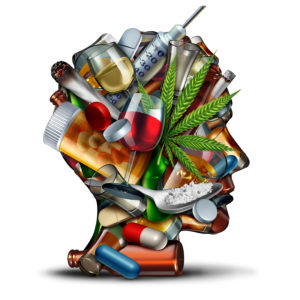
Understanding Addiction:
- Addiction is a chronic disease. It alters both brain function and structure.
- The release of Dopamine interacts with Glutamate in the brain and hijacks its process of reward-related learning. This key system is responsible for sustaining life, as it links activities needed for human survival with reward and pleasure. Translation? Addiction can build pathways in the brain that link the addictive behaviour to a need for survival.
- Addiction is not only substance related. Addiction can also be linked to pleasurable activities such as gambling, sex and shopping for example.
Ways in which you can support a loved one struggling with addiction:
- Obtain your own support. Al-Anon and Nar-Anon are just two of several support groups available. This is especially important in terms of freeing yourself of blame and not taking it personally.
- There are several treatment options that can effectively treat addiction. Encourage your loved one to speak with their family doctor to access support. Do not criticize or threaten. You cannot force them to quit, but you can be a source of strength and positive encouragement.
- Expect setbacks. The road to recovery is not straight and flat. There will be difficulties and detours.
- As much as possible, establish trust and communicate effectively. https://www.verywellmind.com/how-to-talk-to-an-addict-22012
- Educate yourself on addiction and if applicable what to expect with treatment.
- Know when to take a step back and let a crisis happen.
- Don’t enable their behaviour and do not tolerate unacceptable behaviour
Canada’s Opioid Crisis:
- In 2017, approx. 11 lives were lost per day due to opioid overdoses.
- 94% of these deaths happened by accident
- Naloxone is a fast-acting drug medicine that can restore breathing within 2-5 minutes and reverse the effect of an opioid overdose. You cannot use it incorrectly, as it only works if you have opioids in your system. It is safe for all ages and has no negative impact if given to a person who has not had an opioid overdose. You can get a Naloxone kit free of charge at most local pharmacies!
See more information @ https://www.canada.ca/en/health-canada/services/opioids/naloxone.html
How can I get help?
A simple solution would be to consult your family doctor.
In addition, Connex Ontario is an online resource for mental health and addiction services all across Ontario. It is a helpful hub for supportive system navigation.
https://www.connexontario.ca/all-mental-health-addiction-service-types












 Sharon Walker, MSW, RSW
Sharon Walker, MSW, RSW Jordon Iorio Hons. BA, RSW
Jordon Iorio Hons. BA, RSW Christine Bibby, B.S.W., M.S.W., R.S.W.
Christine Bibby, B.S.W., M.S.W., R.S.W. Brianna Kerr, RSW
Brianna Kerr, RSW Danielle Vanderpost, RSW
Danielle Vanderpost, RSW Daniela Switzer, MA, C.PSYCH
Daniela Switzer, MA, C.PSYCH Tammy Adams
Tammy Adams Jade Bates, RMT
Jade Bates, RMT Caitlin Schneider
Caitlin Schneider Dr. Crysana Copland
Dr. Crysana Copland
 Amy Dougley
Amy Dougley Emily Kamminga
Emily Kamminga Bill Dungey, RSW
Bill Dungey, RSW



 Jessica Moore, RSW
Jessica Moore, RSW Abigail Wragge, RSW
Abigail Wragge, RSW Melanie Clucas
Melanie Clucas Ally Legault
Ally Legault Kunle Ifabiyi
Kunle Ifabiyi Tammy Prince
Tammy Prince
